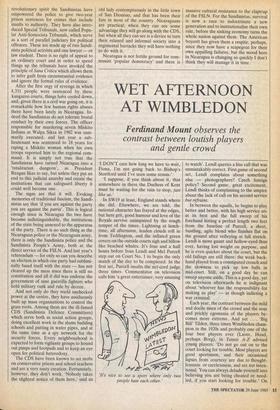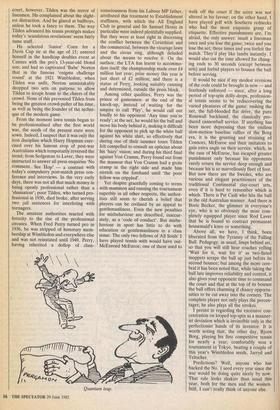WET AFTERNOON AT WIMBLEDON
Ferdinand Mount observes the
contrast between loutish players and gentle crowd
'I DON'T care how long we have to wait, Fiona, I'm not going back to Bishop's Stortford until I've seen some tennis.'
'I suppose, if you think about it, that somewhere in there the Duchess of Kent must be waiting for the rain to stop, just like us.'
In SW19 at least, England stands where she did. Elsewhere, we are told, the national character has frayed at the edges, but here grit, good humour and love of the Royals survive unimpaired by the rough temper of the times. Lightning at lunch- time; all afternoon, leaden clouds roll in from Teddington, and the inflated green covers on the outside courts sigh and billow like beached whales. It's four and a half hours before Ivan Lendl and Mel Purcell step out on Court No. 1 to begin the only match of the day to be completed. In the first set, Purcell insults the net-cord judge three times. Commentator on television calls him 'a great entertainer, very amusing 'It's nice to see a sport where only two people hate each other.' to watch'. Lendl queries a line call that was unmistakably correct. First game of second set, Lendl complains about something else — photographers? Czech foreign policy? Second game, great excitement, Lendl thinks of complaining to the umpire about the lack of call on his second service but refrains. • In between the squalls, he begins to play better and better, with his high service arc at its best and the full sweep of his forehand hitting a perfect length two feet from the baseline of Purcell, a short, bustling, agile blond who finishes flat on the ground after volleying at full stretch. Lendl is more gaunt and hollow-eyed than ever, having lost weight on purpose, and he is even quicker about the.court, but the old failings are still there: the weak back- hand played from a constipated crouch and the slowness to pick up low balls in mid-court. Still, on a good day he can sweep anyone aside. This is a good day, yet on television afterwards he is indignant about 'whoever has the responsibility for making us play' — as though indicting a war criminal.
Each year, the contrast between the mild and docile mien of the crowd and the sour and prickly egomania of the players be- comes more extreme. And yet . . . 'Big Bill' Tilden, three times Wimbledon cham- pion in the 1920s and probably one of the four best players ever (Laver, Hoad, perhaps Borg), in Tennis A-Z advised young players: `Do not go out on to the court looking for trouble. Most players are good sportsmen, and their occasional lapses from courtesy are due to thought- lessness or carelessness, and are not inten- tional. You can always delude yourself into believing you are being cheated or need- led, if you start looking for trouble.' On court, however, Tilden was the terror of linesmen. He complained about the slight- est distraction. And he glared at ballboys, unless he took a fancy to them. The way Tilden advanced his tennis proteges makes today's 'scandalous revelations' seem fairly tame stuff.
He selected 'Junior' Coen for a Davis Cup tie at the age of 15; entered himself in the handicap doubles event at Cannes with the pro's 13-year-old blond son; and had so captivated 'Babe' Norton that in the famous 'enigma challenge round' at the 1921 Wimbledon; when Tilden was unfit, Norton unmistakably dropped two sets on purpose to allow Tilden to scrape home to the cheers of the crowd. None of this prevented Tilden from being the greatest crowd-puller of his time, as well as being the founder of the techni- que of the modern game.
From the moment lawn tennis began to be professionalised after the first world war, the seeds of the present state were sown. Indeed, I suspect that it was only the iron discipline which Harry Hopman exer- cised over his famous crop of post-war Australians which temporarily reversed the trend; from Sedgeman to Laver, they were instructed to answer all press enquiries 'No comment. See Rop' — a contrast with today's compulsory post-match press con- ference and interviews. In the very early days, there was not all that much money in being openly professional rather than a `shamateue; poor Tilden, who turned pro- fessional in 1930, died broke, after serving two jail sentences for interfering with teenagers.
The amateur authorities reacted with ferocity to the rise of the professional circuses. When Fred Perry turned pro in 1936, he was stripped of honorary mem- bership at Wimbledon and everywhere else and was not reinstated until 1949. Perry, having inherited a dollop of class- consciousness from his Labour MP father, attributed this treatment to Establishment stuffiness, with which the All England Club in general and Sir Samuel Hoare in particular were indeed plentifully supplied. But they were at least right in discerning the conflict between the Corinthian and the commercial, between the vicarage lawn and the circus ring, although deluded about the means to resolve it. On the surface, the LTA has learnt to accommo- date itself: the championship made over £4 million last year; prize money this year is just short of £2 million; and there is a statue of Perry, looking suitably cunning and determined, outside the press block.
Among other qualities, Perry was the prince of gamesmen: at the end of the knock-up, instead of waiting for the umpire to call 'Play', he would call out loudly to his opponent 'Any time you're ready'; at the net, he would hit the ball and move his body behind it, making it difficult for the opponent to pick up the white ball against his white shirt, so effectively that during one of their summer tours Tilden felt compelled to consult an optician about his 'hazy' vision; and during his third final against Von Cramm, Perry found out from the masseur that Von Cramm had a groin cramp in the right side and made him stretch on the forehand until 'the poor fellow was crippled'.
Yet despite gracefully coming to terms with mammon and running the tournament superbly in all other respects, the author- ities still seem to cherish a belief that players can be civilised by an appeal to gentlemanliness. Even the new penalties for misbehaviour are described, inaccur- ately, as a 'code of conduct'. But misbe- haviour in sport has little to do with education or gentlemanliness in a class sense. The only two fellows of All Souls' I have played tennis with would have out- McEnroed McEnroe; one of them used to
Quantum leap.
walk off the court if the score was not altered in his favour; on the other hand, I have played golf with Southern rednecks who had the most exquisite grasp of etiquette. Effective punishments are, I'm afraid, the only answer: insult a linesman once and you lose the game; twice and you lose the set; three times and you forfeit the match. They'd play like lambs instantly. I would also cut the time allowed for chang- ing ends to 30 seconds (except between sets) and forbid players to bounce the ball before serving.
It would be nice if my modest revisions of the code could be brought in now — and fearlessly enforced — since, after a long period of top-spin dolly-drops, profession- al tennis seems to be rediscovering the varied pleasures of the game: rushing the net, the full-blooded flat drive, the pure Rosewall backhand, the classically pro- duced cannonball service. If anything has been more depressing than the endless slow-motion baseline rallies of the Borg era, it is the grunting and straining of Connors, McEnroe and their imitators to gain extra angle on their service, which, in the case of McEnroe, has escaped greater punishment only because his opponents rarely return the service deep enough and because his is so marvelously fleet of foot. But now there are the Swedes, who are various and elegant practitioners of the traditional Continental clay-court arts, even if it is hard to remember which is which. There is Pat Cash who hits the ball in the old Australian manner. And there is Boris Becker, the glimmer in everyone's eye, who is so obviously the most com- pletely equipped player since Rod Laver that he is bound to contract permanent housemaid's knee or something.
Above all, we have, I think, been liberated from the Tyranny of the Falling Ball. Pedagogy, as usual, limps behind art, so that you will still hear coaches yelling 'Wait for it, wait for it' as two-fisted moppets scrape the ball up just before its second bounce; but among the more cere- bral it has been noted that, while taking the ball late improves reliability and control, it also gives your opponent time to command the court and that at the top of its bounce the ball offers charming if chancy opportu- nities to be cut away into the corners. The complete player not only plays the percen- tages; he also plays all the strokes.
I persist in regarding the excessive con- centration on looped top-spin as a manner- ist deviation which is invincible only in the perfectionist hands of its inventor. It is worth noting that, the other day, Bjorn Borg, playing his first competitive tennis for nearly a year, comfortably won a tournament in Tokyo, beating a couple of this year's Wimbledon seeds, Jarryd and Teltscher.
Predictions? Well, anyone who has backed the No. 1 seed every year since the war would be doing quite nicely by now. That rule looks shakier than usual this year, both for the men and the women. Still, I can't really think of anyone else.



























































 Previous page
Previous page